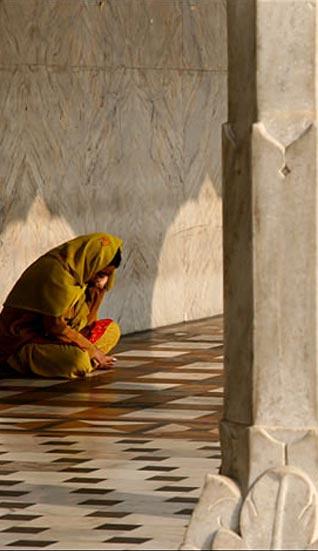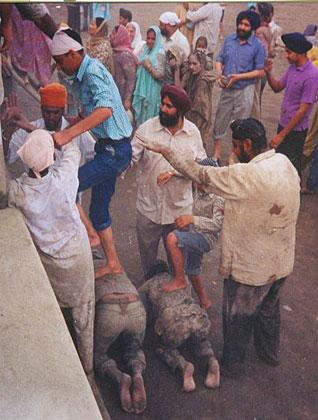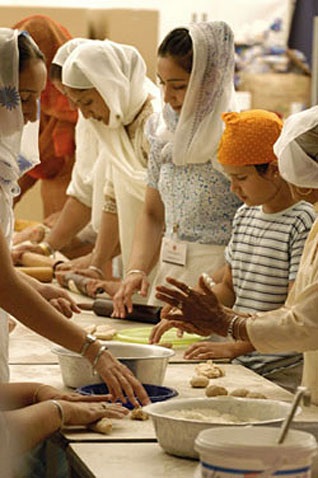Talking Stick
Jinnaah Naam Juppeyyah, Vund Chhukkeyyah
Ardaas Part IV
The Talking Stick Colloquium # 36, Nov 15 - 21
Convenor: RAVINDER SINGH TANEJA
THE DIALOGUE - So Far
The recall of iconic and historic figures (the Panch, if you will) in the ardaas serves as a constant reminder of our glorious past and the heroes worthy of our emulation.
Apart from the Gurus, no individual is called out separately. Even in the case of the Gurus, their presence is forever captured and crystallized in the Sabad Guru (Guru Granth Sahib).
The lesson - which we seem to have forgotten - is that the way of the Guru rests ultimately not on personal but collective leadership that is rooted in the twin institutions of Guru Panth and Guru Granth.
THIS WEEK
This week we move on to the remaining portion of the passage we touched on last week:
Jinnaah Naam juppeyyah, Vund chhukkeyyah, Degh chalaa-ee, Tegh vaahee, Dekh ke un-dith keetaa, tinnah pyaareyyan, sachhiaar-yaa(n) di kumaa-ee da dhiaan dhar ke, Khalsa ji! Bolo ji WaheGuru!
THE MESSAGE
Having listed our heroes, the ardaas turns to the reasons we commemorate them. Reflected in these lines are guidelines for Sikh personal and institutional behavior.
Jinnaah Naam juppeyyah
The concept of Naam cannot be adequately treated here, nor am I qualified to do so. But suffice to say that Naam is, without doubt, central to gurmat and we will do our best to understand it within the constraints of space and our own knowledge.
The term Naam appears over five thousand times in the Guru Granth Sahib and is used with various connotations: as a noun denoting God's name, who remains, paradoxically enough, Nameless; as the process that creates and sustains all Existence; as a synonym for the Creator itself and ultimately, Naam is both the
summum bonum of Sikh life as well as its praxis (methodology and practice).
Hidden in the Cause of Creation is the means, the method itself.
Juppna essentially means practice (abhiyaas), through recitation/ repetition. Viewed thus, Naam Juppna in the ardaas refers to the practice of Naam - the discipline that forms the basis of an individual Sikh's life. This discipline is also referred to as the recitation or practice of the Word (shabad abhiyaas).
Interestingly enough, while Naam and Shabad have been used interchangeably in gurbani, only Shabad has been referred to as Guru (Enlightener), whereas Naam is the revelation of the Guru as Enlightener (Shabad). Shabad, which is also expressed as speech and represented by words in the Guru Granth Sahib, becomes the vehicle of communicating with Naam.
Note, however, that the expression of Shabad as speech and words (as contained in the Guru Granth Sahib) are only pointers to a higher Truth which is available to a receptive mind. It is the cultivation of this receptivity that we call Naam Juppna.
Naam Juppna remains, at bottom, an individual activity spanning meditation, critical introspection and self-examination so as to broaden the mind to become receptive to Sat Naam by freeing itself from parochial conditioning (cultural, physical, etc)
It is for this reason that a Khalsa is expected to be universal in outlook.
Vund chhukkeyyah
If Naam is the creative blueprint of Existence, then Dharam is its desired social expression which is possible only if individual human consciousness flowers with inner virtues: compassion, empathy, productivity and sharing.
The practice of Dharam is what makes for the ideal of the Gurus, "Halemi Raj."
The adage, "Naam Juppo, Kirat Karo, Vund Chhako," attributed to Guru Nanak pretty much sums up Sikh philosophy.
Degh chalaa-ee
The word Degh refers to a large cooking utensil with a wide open mouth commonly used for cooking in large gurdwaras. Its shape and dimension signifies Divine largesse, and the practice of cooking in a degh symbolizes the institutional practice of Langar or open/ free kitchen, a hallmark of the Sikh commitment to the larger welfare of humanity.
The word Degh is also used for the Karah Parshad that is served in gurdwaras.
The development of the institution of Langar began with Guru Nanak. Tradition has it that by the time of Guru Gobind Singh, there were five open kitchens operating in Anandpur Sahib alone, feeding the entire local community.
Eating together became at once a communal practice that encouraged volunteerism and sharing, but also a movement to break down caste barriers that demanded separate caste based kitchens.
Tegh vaahee
The virtue of Charity, as exemplified by the Degh, is supplemented by the practice of chivalry and valor, symbolized by the Tegh, or the all-steel sword. In the previous week's dialogue, we saw how Guru Gobind Singh invested the sword with a deeper, symbolic and expanded meaning - that of the creative power of the Creator as well as his absolute justice in the temporal world.
Taken together, Degh and Tegh constitute a composite virtue that the Khalsa must embody.
"Degh Tegh Fateh," was the emblem of Banda Singh Bahadar's short lived Khalsa State and he struck coins that had inscribed on them this maxim.
Dekh ke un-dith keetaa
The English equivalent of this phrase would be to 'overlook transgressions'. The Creator is forever overlooking our transgressions and that quality of forgiveness is what a Sikh must cultivate. Forgiveness and bravery go hand in hand.
Tinnah pyaareyyan, sachhiaar-yaa(n) di kumaa-ee da dhiaan dhar ke, Khalsa ji! Bolo ji WaheGuru!
The refrain here is an injunction to remember the struggles of the heroes of Sikh history and, through them, the glory to God.
LET'S PONDER TOGETHER
This passage of our ardaas recalls our heroes and the virtues they practiced to create a commonwealth based on compassion, charity, valor and forgiveness.
The spiritual practice of Naam Juppna enhances us so that we become less parochial and more inclusive. Naam is also a synonym for Love, the other central doctrine of Sikh teaching. A life immersed in Naam and Love must forever be expanding to include a widening community and ultimately all humanity (Sarbat da Bhalla).
The practice of Love needs to be understood in the context of gurbani. Love is not as easy it seems, nor does it just happen (despite our belief to the contrary). It is definitely an art that needs to be cultivated.
November 15, 2010
Conversation about this article
1: Ravinder SinghTaneja (Westerville, Ohio, U.S.A.), November 16, 2010, 11:02 AM.
In writing about our heroes, I could not help but think of Joseph Campbell, who has written extensively about common mythological narratives across different cultures. One of his works is entitled, "The hero with a thousand faces," where he describes a hero's journey as a mythic one: venturing into regions of supernatural wonder, he writes, a hero overcomes great odds to win a decisive victory over fabulous forces and returns with the power to bestow boons on his fellow man. Isn't this the pattern we discern in Sikhi, as well? Naam Juppna being the journey into the depths of our being, the battle against and victory over Haumai and the return to take a stand? The same message is conveyed in the saakhi of Guru Nanak and his disappearance in the river Bein, returning a transformed man committed to spread the message of "Na koi Hindu na Mussalman." The question for us is obvious: where do we stand, individually and as a community?
2: Gurinder Singh (Stockton, California, U.S.A.), November 17, 2010, 9:36 AM.
Guru Gobind singh ji writes in the Dasam Granth: "Degh tegh jugg mai dou chalai" - The degh and tegh both must prevail in the world. It means that charity, compassion, and serving the weak and the defenceless are the collective obligations of every Sikh.
3: Ravinder Singh Taneja (Westerville, Ohio, U.S.A.), November 17, 2010, 2:42 PM.
What about, "Dekh ke un-dith keetaa?" Overlooking transgressions and slights, real or perceived? And where do we draw the line? How does justice fit into all this? We might brush off an offensive remark, but what about more serious transgressions? Guru Gobind Singh was willing to travel a great distance to seek redress from Aurangzeb whose administration was responsible for putting his father to death and uprooting him and his family from Anandpur. Would that be practicing "Dekh ke un-dith keetaa?"
4: Mohan Singh (Toronto, Ontario, Canada.), November 18, 2010, 10:10 AM.
"Dekh ke un-dith keeta" - First and foremost, it is Almighty Waheguru who feeds all His creatures, good, bad, ugly, dirty or criminals. Guru Arjan said: "Kaura bol naa janai puran Bhagwane/ augun ko naa chitare" - 'He does not know any bitter words; the Perfect Lord God does not even consider my faults and demerits' [GGS: 784]. Guru Amardas said: "You Yourself created the counterfeit and the genuine" [GGS:119]. Next come parents to their child: "Dekh ke un-dith keetaa" as in "As the child, innocently making thousands of mistakes - His father teaches him, and scolds him so many times, but still, he hugs him close in his embrace. Please forgive my past actions, God, and place me on Your path for the future." [GGS:624]. Guru Angad to Humayun, Guru Amardas to Datu, Guru Ramdas and Guru Arjan to Baba Prithi Chand, Guru Hargobind to Baba Dhirmall, Guru Har Rai to Baba Ramrai, Guru Teg Bahadar to Aurangzeb, who killed Bhai Dyala, Bhai Mati Das and Bhai Sati Das in front of him and Guru Sahib himself embraced martyrdom. Guru Gobind Singh, who lost his father, mother, all his four sons and he too 'dekh ke un-dith keetaa' and continued his mission. Further Sayeen Mian Mir, Bhai Gurdas, Bhai Bidhi Chand, who witnessed the martyrdom Guru Arjan, they stayed in Hukam as instructed by the Guru. As regards "Naam juppeyyah ... Vund chhukkeyyah ...", you will find such devotees even today, may be a few in millions, but they are also included in this category and the list will continue to grow through time.






